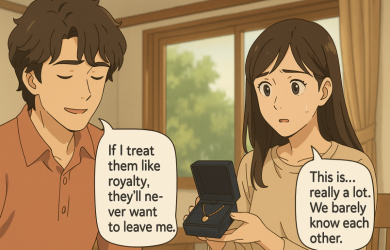How Long Does the Love Bombing Phase Last & Ways to Deal

Unlock Daily 30-Sec Tips for a Happier Relationship
👉 Subscribe FREEKey Takeaways
Marriage.com AI Quick Summary
When someone sweeps you off your feet with grand gestures, constant attention, and words that feel like magic, it can be easy to get caught up in the whirlwind. It all seems perfect—almost too perfect.
But what happens when the intensity starts to shift?
The love bombing phase, often marked by overwhelming affection and praise, can feel both thrilling and disorienting.
At first, it might seem like a dream come true; everything you have ever wanted is suddenly in front of you. Yet, beneath the surface, questions might start to creep in.
Is this connection genuine?
Why does something so sweet feel strangely overwhelming at times?
Relationships built on such intensity can leave someone feeling conflicted and unsure of what is real. It is a lot to process, especially when emotions run high, and clarity feels just out of reach.
What does a love bombing phase look like?
The love bombing phase often feels like stepping into a whirlwind of affection. Someone might shower another with endless compliments, surprise gifts, or constant texts that initially seem sweet but quickly become overwhelming.
They may declare their feelings intensely and early, making promises that feel too big for such a short time. Love bombing examples could include someone planning elaborate dates out of the blue or insisting they are “soulmates” after only a few conversations.
At first, it might feel flattering—who would not want such devotion?
But over time, it can start to feel like too much, leaving little room to breathe or think clearly.
5 ways love bombing, and narcissistic relationships are connected
Love bombing and narcissistic relationships often go hand in hand, creating a confusing mix of intense affection and underlying control. While it can feel like pure devotion at first, the reality behind these behaviors often reveals a pattern of manipulation.
Recognizing the connection can help make sense of the signs of love bombing and the deeper dynamics at play.
1. Intensity masks manipulation
Love bombing often begins with overwhelming intensity—constant texts, grand gestures, and declarations of love that feel larger than life. In narcissistic relationships, this is not just affection; it is a way to gain control.
The flattery and attention create dependency, making it harder for someone to recognize unhealthy behaviors later on.
2. Shifting focus to control
The love bombing phase does not last forever; over time, it often shifts to criticism, gaslighting, or emotional distance.
A study explored love bombing behaviors among Millennials, linking them to narcissism, low self-esteem, and insecure attachment styles. Love bombing, involving excessive communication for control, correlated with narcissism, avoidant/anxious attachment, media usage, and negative psychological impacts, warranting further research.
Narcissists may use the bond created during love bombing to establish control, leaving the other person questioning what they did wrong. This shift can feel disorienting and deeply hurtful.
3. Conditional affection
Narcissistic relationships often tie affection to specific behaviors or expectations. During the love bombing phase, the attention feels unconditional, but over time, it becomes clear that love is given or withdrawn based on the narcissist’s needs.
This cycle of giving and taking affection creates confusion and insecurity.
4. Undermining independence
In many cases, love bombing subtly undermines someone’s independence. The constant attention can pull someone away from friends, family, or hobbies.
Narcissists may frame this as devotion, but the underlying goal is often isolation, making it easier to maintain control over the relationship.
5. Emotional highs and lows
The cycle of love bombing and devaluation creates a rollercoaster of emotions, leaving someone craving the initial intensity of the relationship.
Narcissistic partners often use this dynamic to keep someone invested, alternating between affection and criticism to maintain power and control.
What is the purpose of love bombing in narcissistic relationships?
The purpose of love bombing in narcissistic relationships often goes beyond simple affection—it is about creating a strong sense of control and dependence.
Through overwhelming attention, constant praise, and grand gestures, a narcissist may try to make someone feel special and deeply valued, almost like they are the center of their world.
But beneath the surface, this intense behavior is often a tactic to gain trust quickly and establish emotional dominance. It can feel wonderful at first, but as the relationship progresses, the true intent becomes clearer.
Love bombing sets the stage for a dynamic where one person holds power, leaving the other vulnerable to manipulation, confusion, and emotional highs and lows.
4 stages of narcissistic abuse and love bombing
Narcissistic abuse often unfolds in distinct stages, starting with the love bombing phase and progressing into more troubling patterns. What begins as overwhelming affection can quickly shift, leaving someone feeling confused, controlled, and emotionally drained.
Understanding these stages can help someone recognize the signs and protect their emotional well-being.
-
Idealization
The first stage is idealization, where the narcissist places their partner on a pedestal. This often involves endless compliments, lavish attention, and declarations of love.
While it may feel like a dream come true, this stage is not purely about admiration; it is about creating an emotional bond quickly. The intensity can be overwhelming, laying the groundwork for control.
-
Devaluation
As the initial intensity fades, the narcissist begins to criticize or belittle their partner. The same person who once made them feel adored now causes self-doubt.
This stage often includes gaslighting and emotional manipulation, leaving someone questioning their worth. The contrast between this and the love bombing phase is deeply destabilizing.
-
Discarding
In the discarding stage, the narcissist may distance themselves emotionally or physically, sometimes ending the relationship entirely.
This abrupt change feels like a betrayal, especially after the stages of love bombing and devaluation. The partner is left grappling with feelings of rejection and confusion, unsure of what went wrong.
Research highlight: Love bombing, often linked to narcissistic and abusive tendencies, involves manipulation to gain control. A study of 45 young adults found insignificant correlations but noted patterns between love bombing, narcissism, and emotional abuse, varying by relationship type.
-
Hoovering
The final stage often involves the narcissist trying to pull their partner back in through promises, apologies, or a return to love bombing.
This is known as hoovering, and it can reignite hope, making it hard to break free. The cycle continues, trapping someone in a pattern of emotional highs and lows.
How long is the love bombing phase in narcissistic relationships: 7 factors to consider
The love bombing phase in narcissistic relationships can vary greatly, leaving many wondering, “How long does love bombing last?”
It often depends on several factors, from the narcissist’s goals to the dynamics of the relationship itself. While it may initially feel intoxicating, understanding the factors influencing its length can bring much-needed clarity.
1. The narcissist’s intentions
The love bombing phase length in a relationship often depends on what the narcissist wants to achieve. If their goal is quick control, the phase might be brief but intense.
On the other hand, if they are trying to secure long-term influence, they may sustain the charm for weeks or even months, all while carefully laying emotional traps.
2. The partner’s responses
A partner’s reaction can play a big role in determining the narcissistic love bombing duration. If someone resists excessive attention or sets boundaries early, the phase may end more quickly.
However, if the partner fully embraces the affection, the narcissist might prolong it to deepen emotional dependency.
3. The relationship context
Every relationship is different, and the length of the love bombing can depend on its context. In new relationships, it may last longer as trust is being built.
In established relationships, it might be shorter, as the narcissist may already feel they have control, shifting to other manipulative tactics sooner.
4. The narcissist’s energy
Maintaining the love bombing phase requires effort and focus, which the narcissist may not sustain indefinitely. Over time, their need for admiration can fade, and they may grow impatient.
As their energy for this phase dwindles, the relationship often shifts into devaluation or neglect.
5. External pressures
Factors like work stress, social obligations, or other relationships can affect how long the narcissist keeps up the love bombing phase.
If they are distracted by external pressures, the intensity of their efforts might wane, cutting the phase short or leading to inconsistent attention.
6. Awareness of manipulation
When someone starts to recognize the signs of manipulation, it can disrupt the love bombing phase. Calling out excessive behaviors or questioning their motives might push the narcissist to shift tactics.
This awareness can often lead to a faster transition out of the love bombing phase.
Watch this video where clinical psychologist Dr. Ramani shares 4 ways narcissists manipulate and punish you:
7. Emotional payoff for the narcissist
The narcissist is driven by how much emotional supply they are getting. If the relationship provides them with consistent validation, they may extend the love bombing phase to keep things running smoothly.
But once the excitement fades, their focus often shifts, bringing the phase to an end.
What happens after the love bombing phase in narcissistic relationships?
After the love bombing phase in a narcissistic relationship, the dynamic often takes a sharp and painful turn. The intense affection and grand gestures fade, replaced by criticism, emotional withdrawal, or manipulation.
This shift can feel confusing—how did someone who once made everything seem perfect suddenly create so much doubt and pain?
Often, the narcissist begins to devalue their partner, undermining their self-esteem and creating a cycle of emotional highs and lows.
The warmth and charm used to build the connection may resurface occasionally, but only to keep their partner emotionally tethered. It is a disorienting and heartbreaking experience that can leave someone questioning their worth.
However, although it may be tough initially, you can come out of this toxic relationship even stronger. Here is how to handle the aftermath of such relationships:
- Acknowledge what happened: Accepting that the love bombing phase was a manipulation tactic can help make sense of the experience.
- Rebuild self-esteem: Focus on activities, relationships, and goals that reaffirm personal value and independence.
- Set firm boundaries: If ongoing contact with the narcissist is necessary, maintain clear boundaries to protect your emotional space.
- Seek support: Lean on trusted friends, family, or professionals to process feelings and regain clarity.
- Educate yourself: Learn about narcissistic behaviors to recognize red flags in future relationships.
- Practice self-care: Prioritize mental and physical well-being through rest, mindfulness, and healthy routines.
- Give yourself time: Healing from the aftermath of the love bombing is a journey; allow space to recover at your own pace.
To sum up
The love bombing phase can leave someone feeling swept off their feet, but understanding its potential duration and the emotional toll it can take is crucial. Recognizing the signs and knowing how to deal with them can help protect one’s emotional well-being.
After all, it is important to remember that genuine love isn’t about overwhelming intensity but about trust, respect, and balance. If you’ve found yourself caught in this cycle, take a step back—there’s no rush to understand everything all at once.
Give yourself the time and space you need to heal, learn, and move forward in healthier, more grounded relationships.
 Tips
Tips
Write your tip or submit a video tip
All tips are reviewed before the publishing.
Share this article on
Want to have a happier, healthier marriage?
If you feel disconnected or frustrated about the state of your marriage but want to avoid separation and/or divorce, the marriage.com course meant for married couples is an excellent resource to help you overcome the most challenging aspects of being married.
Recent Articles
Related Quizzes
Unlock Daily 30-Sec Tips for a Happier, Healthier Relationship
👉 Subscribe FREE on YouTube We'd love your feedback!
We'd love your feedback!
 Expert Q&A
Expert Q&A
Ask your question related to this topic & get the support you deserve from experts.



















 Thanks for your feedback!
Thanks for your feedback!